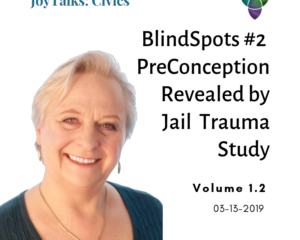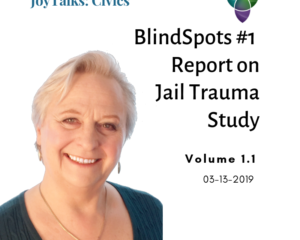JoyTalk: Doug Gustafson Homes Now Not Later Civic Conversation
Why did Doug Gustafson (a young entrepreneur working in the medical technology world) decide to get involved in politics and civic crisis issues in 2016? And why did this involvement lead to the eventual result that he founded a grassroots non-profit, Homes Now, Not Later?
What were some growing pains before Unity Village was created? It started first as a movement for shelter and a shower truck, then a tent encampment in the winter, and eventually 25 homes.
Then what? This video is one of several in a series about how the community has been steeping up to solve homeless challenges, poverty, economic conflicts and trauma. What was behind Doug’s focus on solving the community business crisis trends of injustice, income inequality, social violence, homelessness, poverty, mental health and a plethera of justice issues?
Listen to Doug’s take on it in this JoyTalk episode with Joy Gilfilen, Host! We invited Irene Morgan to sit in on the interview for she knows that providing safe housing is a key issue in the recycling of criminalizing of poverty! Irene founded the Restorative Community Coalition in 2006 and one of her greatest visions is to create a RestoreALife Center as another piece of the community’s housing puzzle to serve those who are dealing with an arrest, recovery and reentry.
It is clear that generational poverty, emotional trauma, living in survival without shelter, with abuse, joblessness, fear of being arrested all compound and create different kinds of distress and mental health troubles. These are all intersectional issues and it is essential that all organizations team up to solving the community wide problems society faces in 2021! From the Generation XY and Millenial technology educated era, Doug is also a visionary who could see the trouble ahead. He got involved in politics in 2016 and eventually founded Homes Now, Not Later as a 501C3 non-profit.
1) By 2019, with the help of strong advocates and teammates, Gustafson finally got Whatcom County’s first tiny home village of 25 cottages up and running – called Unity Village! It was not easy – and it took alot of public action, difficult conversations with people across the community and some hard knocks with the bureaucrats and politicians to change things. Eventually the emotional courage, hard work, prayers, donations and dedication by hundreds of people got it done!
2)In 2021 a 2nd village – Swift Haven – was launched! This is the first of a series of conversations with other community activist-leaders who are laying the foundations for deeper and stronger collaborations – for many hands workng together are aching to build strong, self-reliance style commerce where people can get their feet under them after misfortune – and they can learn about self-accountability, community leadership, cooperation!
Today Homes Now, Not Later feels confident that their prototype of how to do community with the homeless is duplicable for other cities and counties! It is economical, affordable, and serves people.
In this interview, you also hear from Irene Morgan who began working on homeless issues back in the 90’s – and realized that one of the biggest root causes of homelessness is the criminalizing of people in poverty. So she founded the RCC in 2006 to help solve the justice system problems and help people with reentry after incarceration. Later, Doug worked with both Joy and Irene on that organization, before Doug chose to focus on homeless issues on purpose!
Today, we all celebrate the evolution of awareness, knowledge and community involvement! With hindsight 2020, we have learned that this year – 2021 – is a watershed year for pioneering more change, more villages and sustainable living enterprises where more and more people can learn how to team up, cooperate band build systems that are innovative!
– Go to www.TheRestorativeCommunity.org to see how Irene Morgan’s trailblazing efforts have spawned the huge local movement for criminal justice and jail system reform.
– Go to www.JoyGilfilen.com to see Joy’s pioneering work in civic leadership, public education and justice system research.
– Go to www.homesnow.org to learn more about Doug Gustafson’s succesful tiny home villages and visions.
All three have a YouTube Channel, plus Facebook pages (Homes Now, Not Later also has FB pages for Unity Village and for Swift Haven. )
You can go to HomesNow.org to donate, volunteer and learn more!


